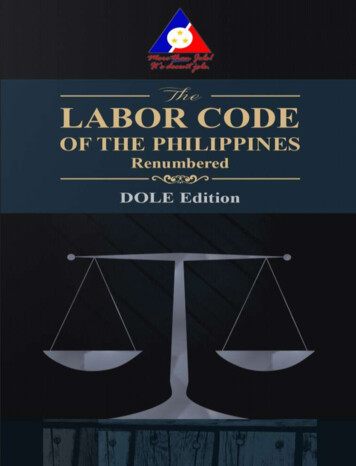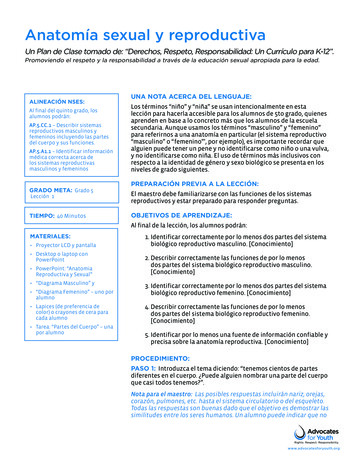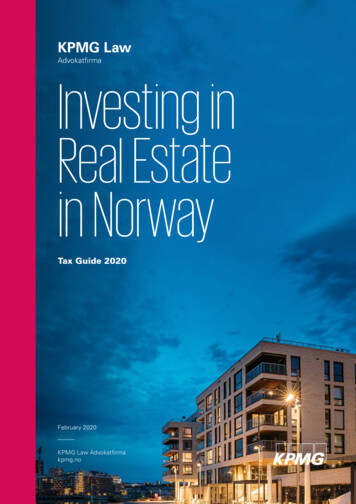
Transcription
NOT FOR SALECopyright 2016 by DOLE.All rights reserved.This Handbook, or any part hereof, may not be reproducedfor commercial purposes without written permission fromthe Department of Labor and Employment.
PRESIDENTIAL DECREE NO. 442 OF 1974, AS AMENDED AND RENUMBEREDA Decree Instituting a Labor Code Thereby Revising and Consolidating Labor and Social Laws to Afford Protection to Labor,Promote Employment and Human Resources Development and Insure Industrial Peace Based on Social JusticePURSUANT TO DOLE DEPARTMENT ADVISORY NO. 01, SERIES OF 2015
PROJECT TEAMROSALINDA DIMAPILIS-BALDOZSecretaryREBECCA C. CHATOUndersecretaryBUREAU OF WORKING CONDITIONSEDITORIAL & RESEARCH TEAMCONSULTANTSATTY. ALVIN B. CURADAOIC-DirectorATTY. MARION SHANE T. MADEJANational Labor Relations CommissionNICANOR V. BONChief, Policy and Program Development DivisionATTY. AMADO C. GASMINATTY. NICOLE L. HERRERADOLE Legal ServiceJULIENNE MARIE C. RECAMARATechnical StaffJEROME P. YANSONDOLE Bureau of Labor RelationsSPECIAL ACKNOWLEDGMENTS:COVER DESIGN:Barrymore C. MabaylanCaselyn Anne C. AlotaDianne Lyneth C. AlavadoEuniz Johanne M. GarciaThis Handbook is published by theDEPARTMENT OF LABOR AND EMPLOYMENTDOLE Building, Muralla cor. Gen. Luna Sts., Intramuros, Manila 1002DOLE Hotline: ( 63 2) 527-8000Web Site: www.dole.gov.ph
FOREWORDSince its promulgation in 1974, PresidentialDecree No. 442 or the Labor Code of the Philippines hasendured a long line of amended, superseded, repealed,and inserted provisions brought about by subsequentlaws.In 2011, Congress enacted Republic Act No. 10151,the Employment of Night Workers, Thereby Repealing Articles 130 and 131 ofwhich renumbered subsequent Labor Code provisions andinserted a new chapter on Employment of Night Workers. This developmentconvinced the Department of Labor and Employment to issue an officialrenumbered Labor Code to reflect all amendments, note all repeals, and crossreference all superseded provisions with related labor laws. Provisions expresslyrepealed by previous laws are still duly noted for reference.This handbook considers the most recent amendments brought aboutby R.A. No. 10395,;An ActStrengthening Conciliation-Mediation as a Voluntary Mode of DisputeSettlement for All Labor Cases; and R.A. No. 10644,Asguide, we also gave due consideration to the latest decisions of the SupremeCourt of the Philippines citing renumbered Labor Code provisions. To ourdelight, the renumbering provided for in DOLE Department Advisory No. 01,Series of 2015 has received legislative approval in R.A. No. 10741 (2016),Act Strengthening the Operations of the NLRC.Despite all the updates, this work endeavors to faithfully retain the textof the original Labor Code, with notes concerning the new terms and namespertaining to DOLE offices and agencies, where appropriate.It is our sincerest hope that this handbook will serve as an important andeasily accessible tool in sustaining our efforts towards better understanding oflabor laws by providing a comprehensive, up-to-date, and user-friendlyreference material for students, law practitioners, and the general public.ROSALINDA DIMAPILIS-BALDOZSecretary
NOTES This work retains the text of the Labor Code of the Philippines in the originalor in its latest legislative amendment or revision. The current Department of Labor and Employment (DOLE) may be referredto in some provisions as:a. Ministry of Labor and Employmentb. Ministry of Laborc. Department of Labor Similarly, in line with Sec. 30 of E.O. No. 126,(1987), the titles ofMinister, Deputy Minister, and Assistant Minister shall be understood torefer to Secretary, Undersecretary, and Assistant Secretary, respectively. The Project Team decided to adopt new numerical designations forprovisions previously annexed or inserted to the Code, e.g., Articles 208-A,238-A, etc. Old numerical designationsprovisions expressly deleted by statutes were removed from the main textbut are retained in the footnotes for reference and/or educational purposes. The decision to designate a separate numerical designation for everydistinct article likewise acknowledges Supreme Court decisions startingFebruary 2013 that refer to renumbered provisions. Examples include PepsiCola v. Molon1 referringpursuantAlvarez v. GTB, Inc.2 which mentioned This work already reflects the most recent amendments pursuant to R.A. No.10741,Relations(2016). Section 3 of the said law contains a Renumbering CForpurposes of uniformity, Articles 213 and 215are renumbered as Articles220 and 222, respectively, in accordance with Department Advisory OrderNo. 01, Series of 2015 issued by the Department of Labor andEmployment.12G.R. No. 175002, February 18, 2013G.R. No. 202158, September 25, 2013
Table of ContentsFOREWORDVNOTESVIPRELIMINARY TITLE11Chapter I - GENERAL PROVISIONSChapter II EMANCIPATION OF TENANTSBOOK ONE - PRE-EMPLOYMENTTITLE I RECRUITMENT AND PLACEMENT OF WORKERSChapter I GENERAL PROVISIONSChapter II REGULATION OF RECRUITMENT AND PLACEMENT ACTIVITIESChapter III MISCELLANEOUS PROVISIONSTITLE II EMPLOYMENT OF NON-RESIDENT ALIENS1111131313202325BOOK TWO HUMAN RESOURCES DEVELOPMENT PROGRAM26TITLE I NATIONAL MANPOWER DEVELOPMENT PROGRAM26Chapter I NATIONAL POLICIES AND ADMINISTRATIVE MACHINERY FOR THEIR IMPLEMENTATION26TITLE II TRAINING AND EMPLOYMENT OF SPECIAL WORKERSChapter I APPRENTICESChapter II LEARNERSChapter III HANDICAPPED WORKERSBOOK THREE CONDITIONS OF EMPLOYMENTTITLE I WORKING CONDITIONS AND REST PERIODSChapter I HOURS OF WORK30303435363636
Chapter II WEEKLY REST PERIODSChapter III HOLIDAYS, SERVICE INCENTIVE LEAVES, AND SERVICE CHARGESTITLE II WAGESChapter I PRELIMINARY MATTERSChapter II MINIMUM WAGE RATESChapter III PAYMENT OF WAGESChapter IV PROHIBITIONS REGARDING WAGESChapter V WAGE STUDIES, WAGE AGREEMENTS, AND WAGE DETERMINATIONChapter VI ADMINISTRATION AND ENFORCEMENTTITLE III WORKING CONDITIONS FOR SPECIAL GROUPS OF EMPLOYEESChapter I EMPLOYMENT OF WOMENChapter II EMPLOYMENT OF MINORSChapter III EMPLOYMENT OF HOUSEHELPERSChapter IV EMPLOYMENT OF HOMEWORKERSChapter V EMPLOYMENT OF NIGHT WORKERSBOOK FOUR HEALTH, SAFETY AND SOCIAL WELFARE BENEFITS38404141424245465254545657606063TITLE I MEDICAL, DENTAL AND OCCUPATIONAL SAFETY63Chapter I MEDICAL AND DENTAL SERVICESChapter II OCCUPATIONAL HEALTH AND SAFETY6364TITLE II EMPLOYEES COMPENSATION AND STATE INSURANCE FUND65Chapter I POLICY AND DEFINITIONSChapter II COVERAGE AND LIABILITYChapter III ADMINISTRATIONChapter IV CONTRIBUTIONSChapter V MEDICAL BENEFITSChapter VI DISABILITY BENEFITSChapter VII DEATH BENEFITSChapter VIII PROVISIONS COMMON TO INCOME BENEFITSChapter IX RECORDS, REPORTS AND PENAL PROVISIONS656971747576787981TITLE III MEDICARE83
TITLE IV ADULT EDUCATION83BOOK FIVE LABOR RELATIONS83TITLE I POLICY AND DEFINITIONS83Chapter I POLICYChapter II DEFINITIONS8384TITLE II NATIONAL LABOR RELATIONS COMMISSIONChapter I CREATION AND COMPOSITIONChapter II POWERS AND DUTIESChapter III APPEAL86868994TITLE III BUREAU OF LABOR RELATIONS95TITLE IV LABOR ORGANIZATIONS98Chapter I REGISTRATION AND CANCELLATIONChapter II RIGHTS AND CONDITIONS OF MEMBERSHIPChapter III RIGHTS OF LEGITIMATE LABOR ORGANIZATIONS98101104TITLE V COVERAGE105TITLE VI UNFAIR LABOR PRACTICES106Chapter I CONCEPTChapter II UNFAIR LABOR PRACTICES OF EMPLOYERSChapter III UNFAIR LABOR PRACTICES OF LABOR ORGANIZATIONS106107108TITLE VII COLLECTIVE BARGAINING AND ADMINISTRATION OF AGREEMENTS109TITLE VII-A GRIEVANCE MACHINERY AND VOLUNTARY ARBITRATION113TITLE VIII STRIKES AND LOCKOUTS AND FOREIGN INVOLVEMENT IN TRADE UNION ACTIVITIES115Chapter I STRIKES AND LOCKOUTSChapter II ASSISTANCE TO LABOR ORGANIZATIONSChapter III FOREIGN ACTIVITIESChapter IV PENALTIES FOR VIOLATION115119119120
TITLE IX SPECIAL PROVISIONSBOOK SIX POST-EMPLOYMENT121125TITLE I TERMINATION OF EMPLOYMENT125TITLE II RETIREMENT FROM THE SERVICE128BOOK SEVEN TRANSITORY AND FINAL PROVISIONS129TITLE I PENAL PROVISIONS AND LIABILITIES129TITLE II PRESCRIPTION OF OFFENSES AND CLAIMS130TITLE III TRANSITORY AND FINAL PROVISIONS130RELATED AND AMENDATORY LAWS134COMPARATIVE LIST OF OLD AND RENUMBERED PROVISIONS135DIRECTORY OF DOLE OFFICES AND ATTACHED AGENCIES149
PRELIMINARY TITLEChapter I - GENERAL PROVISIONSART. 1. Name of Decree.ART. 2. Date of Effectivity.promulgation.3This Code shall take effect six (6) months after itsART. 3. Declaration of Basic Policy. 4The State shall afford protection tolabor, promote full employment, ensure equal work opportunities regardless of sex,race or creed, and regulate the relations between workers and employers. The Stateshall assure the rights of workers to self-organization, collective bargaining, securityof tenure, and just and humane conditions of work.ART. 4. Construction in Favor of Labor.All doubts in the implementationand interpretation of the provisions of this Code, including its implementing rulesand regulations, shall be resolved in favor of labor.ART. 5. Rules and Regulations.The Department of Labor and othergovernment agencies charged with the administration and enforcement of this Codeor any of its parts shall promulgate the necessary implementing rules andregulations. Such rules and regulations shall become effective fifteen (15) days afterannouncement of their adoption in newspapers of general circulation.ART. 6. Applicability. All rights and benefits granted to workers under thisCode shall, except as may otherwise be provided herein, apply alike to all workers,whether agricultural or non-agricultural.5Chapter II EMANCIPATION OF TENANTS6ART. 7. Statement of Objectives.Inasmuch as the old concept of landownership by a few has spawned valid and legitimate grievances that gave rise toviolent conflict and social tension and the redress of such legitimate grievancesbeing one of the fundamental objectives of the New Society, it has become3The Labor Code of the Philippines took effect on November 1, 1974.4See also the policy declarations in Sec. 3, Art. XIII of the 1987 Constitution of the Republic of the Philippines.5As amended by P.D. No. 570-A,6Provisions of this Chapter were amended by R.A. No. 6657 (1988),(1974).
imperative to start reformation with the emancipation of the tiller of the soil from hisbondage.7ART. 8. Transfer of Lands to Tenant-Workers.Being a vital part of the laborforce, tenant-farmers on private agricultural lands primarily devoted to rice and cornunder a system of share crop or lease tenancy whether classified as landed estate ornot shall be deemed owner of a portion constituting a family-size farm of five (5)hectares if not irrigated and three (3) hectares if irrigated.In all cases, the land owner may retain an area of not more than seven (7)hectares if such landowner is cultivating such area or will now cultivate it.ART. 9. Determination of Land Value. 8 For the purpose of determining thecost of the land to be transferred to the tenant-farmer, the value of the land shall beequivalent to two and one-half (2-1/2) times the average harvest of three (3) normalcrop years immediately preceding the promulgation of Presidential Decree No. 27on October 21, 1972.The total cost of the land, including interest at the rate of six percent (6%) perannum, shall be paid by the tenant in fifteen (15) years of fifteen (15) equal annualamortizations.cooperativein which the defaulting tenant-farmer is a member, with the cooperative having aright of recourse against him.The government shall guarantee such amortizations with shares of stock ingovernment-owned and government-controlled corporations.ART. 10. Conditions of Ownership.No title to the land acquired by thetenant-farmer under Presidential Decree No. 27 shall be actually issued to him unlessand until he has become a fullcooperative.Title to the land acquired pursuant to Presidential Decree No. 27 or the LandReform Program of the Government shall not be transferable except by hereditarysuccession or to the Government in accordance with the provisions of Presidential7See also R.A. No. 6657,Declaration of Principles and Policies. - It is the policy of the State to pursue aComprehensive Agrarian Reform Program (CARP). The welfare of the landless farmers and farmworkers will receive the highest consideration to promote social justice and to move thenation toward sound rural development and industrialization, and the establishment of owner cultivatorship of economic8Modified by Sec. 17 of R.A. No. 6657rties, its nature,actual use and income, the sworn valuation by the owner, tax declarations, and the assessment made by government assessors shall be considered. The social and economic benefitscontributed by the farmers and the farmworkers and by the government to the property as well as the non-payment of taxes or loans secured from any government financing institution onthe sai12
Decree No. 27, the Code of Agrarian Reforms and other existing laws andregulations.9ART. 11. Implementing Agency. The Department of Agrarian Reform shallpromulgate the necessary rules and regulations to implement the provisions of thisChapter.Book One - PRE-EMPLOYMENTART. 12. Statement of Objectives.It is the policy of the State:a) To promote and maintain a state of full employment through improvedmanpower training, allocation and utilization;b) To protect every citizen desiring to work locally or overseas by securing forhim the best possible terms and conditions of employment;c) To facilitate a free choice of available employment by persons seeking workin conformity with the national interest;d) To facilitate and regulate the movement of workers in conformity with thenational interest;e) To regulate the employment of aliens, including the establishment of aregistration and/or work permit system;f) To strengthen the network of public employment offices and rationalize theparticipation of the private sector in the recruitment and placement of workers,locally and overseas, to serve national development objectives;g) To insure careful selection of Filipino workers for overseas employment inorder to protect the good name of the Philippines abroad.Title I RECRUITMENT AND PLACEMENT OF WORKERS10Chapter I GENERAL PROVISIONSART. 13. Definitions.(a) "Worker" means any member of the labor force,whether employed or unemployed.9The second paragraph of Art. 10 was superseded by R.A. No. 6657Transferability of Awarded Lands. - Lands acquired by beneficiaries under this Act may not be sold,transferred or conveyed except through hereditary succession, or to the government, or the LBP, or to other qualified beneficiaries for a period of ten (10) years: Provided, however, That thechildren or the spouse of the transferor shall have a right to r10See also R.A. No. 8042Migrant Workers & Overseas Filipinos Act.13
(b) "Recruitment and placement" refers to any act of canvassing, enlisting,contracting, transporting, utilizing, hiring or procuring workers, and includesreferrals, contract services, promising or advertising for employment, locally orabroad, whether for profit or not: Provided, That any person or entity which, in anymanner, offers or promises for a fee, employment to two or more persons shall bedeemed engaged in recruitment and placement.(c) "Private fee-charging employment agency" means any person or entityengaged in recruitment and placement of workers for a fee which is charged, directlyor indirectly, from the workers or employers or both.(d) "License" means a document issued by the Department of Labor authorizinga person or entity to operate a private employment agency.(e) "Private recruitment entity" means any person or association engaged in therecruitment and placement of workers, locally or overseas, without charging, directlyor indirectly, any fee from the workers or employers.(f) "Authority" means a document issued by the Department of Laborauthorizing a person or association to engage in recruitment and placementactivities as a private recruitment entity.(g) "Seaman" means any person employed in a vessel engaged in maritimenavigation.(h) "Overseas employment" means employment of a worker outside thePhilippines.(i) "Emigrant" means any person, worker or otherwise, who emigrates to aforeign country by virtue of an immigrant visa or resident permit or its equivalent inthe country of destination.ART. 14. Employment Promotion.power and authority:The Secretary of Labor shall have the(a) To organize and establish new employment offices in addition to the existingemployment offices under the Department of Labor as the need arises;(b) To organize and establish a nationwide job clearance and information systemto inform applicants registering with a particular employment office of jobopportunities in other parts of the country as well as job opportunities abroad;(c) To develop and organize a program that will facilitate occupational, industrialand geographical mobility of labor and provide assistance in the relocation ofworkers from one area to another; and14
(d) To require any person, establishment, organization or institution to submitsuch employment information as may be prescribed by the Secretary of Labor.ART. 15. Bureau of Employment Services. 11 (a) The Bureau of EmploymentServices shall be primarily responsible for developing and monitoring acomprehensive employment program. It shall have the power and duty:121. To formulate and develop plans and programs to implement theemployment promotion objectives of this Title;2. To establish and maintain a registration and/or licensing system to regulateprivate sector participation in the recruitment and placement of workers, locally andoverseas, and to secure the best possible terms and conditions of employment forFilipino contract workers and compliance therewith under such rules and regulationsas may be issued by the Minister of Labor;3. To formulate and develop employment programs designed to benefitdisadvantaged groups and communities;4. To establish and maintain a registration and/or work permit system toregulate the employment of aliens;5. To develop a labor market information system in aid of proper manpowerand development planning;6. To develop a responsive vocational guidance and testing system in aid ofproper human resources allocation; and7.To maintain a central registry of skills, except seamen.(b) The regional offices of the Ministry of Labor shall have the original andexclusive jurisdiction over all matters or cases involving employer-employee relationsincluding money claims, arising out of or by virtue of any law or contracts involvingFilipino workers for overseas employment except seamen: Provided, That the Bureauof Employment Services may, in the case of the National Capital Region, exercisesuch power, whenever the Minister of Labor deems it appropriate. The decisions of11Sec. 3 of E.O. No. 797 (1982),created the Bureau of Local Employment which assumed the functions of the Bureau of Apprenticeship and the domestic employment functions of the Bureau of Employment Services.12Functions enumerated under paragraph (a) have been superseded by Sec. 17, Chapter 4, Title VII, Book IV of E.O. No. 292 (1987),: Section 17.Bureau of Local Employment. - The Bureau of Local Employment shall: (1) Formulate policies, standards and procedures on productive manpower resources, development, utilization andallocation; (2) Establish and administer a machinery for the effective allocation of manpower resources for maximum employment and placement; (3) Develop and maintain a responsivevocational guidance and testing system in aid of proper human resources allocation; (4) Regulate and supervise private sector participation in the recruitment and placement of workerslocally under such rules and regulations as may be issued by the Secretary; (5) Establish and maintain a registration or work permit system to regulate employment of aliens; (6) Developand maintain a labor market information system in aid of proper manpower and development planning; (7) Formulate employment programs designed to benefit disadvantaged groupsand communities; and (8) Perform other functions as may be provided by law.15
the regional offices of the Bureau of Employment Services, if so authorized by theMinister of Labor as provided in this Article, shall be appealable to the NationalLabor Relations Commission upon the same grounds provided in Article 223 13hereof. The decisions of the National Labor Relations Commission shall be final andunappealable.14(c) The Minister of Labor shall have the power to impose and collect fees basedon rates recommended by the Bureau of Employment Services. Such fees shall bedeposited in the National Treasury as a special account of the General Fund, for thepromotion of the objectives of the Bureau of Employment Services, subject to theprovisions of Section 40 of Presidential Decree No. 1177. 15ART. 16. Private Recruitment. Except as provided in Chapter II of this Title, noperson or entity other than the public employment offices, shall engage in therecruitment and placement of workers.ART. 17. Overseas Employment Development Board. 16An OverseasEmployment Development Board is hereby created to undertake, in cooperationwith relevant entities and agencies, a systematic program for overseas employmentof Filipino workers in excess of domestic needs and to protect their rights to fair andequitable employment practices. It shall have the power and duty:1. To promote the overseas employment of Filipino workers through acomprehensive market promotion and development program;13Now renumbered as Art. 229 (Appeal).14Paragraph (b) of Art. 15 was superseded by E.O. No. 797 (1982), Sec. 4 ofand exclusive jurisdiction over all cases, including money claims, involving employer-employee relations arising out of or by virtue of any law or contract involving Filipino workers for15P.D. No. 1177, Revising the Budget Process in Order to Institutionalize the Budgetary Innovations of the New Society16The functions of the Overseas Employment Development Board (OEDB) are now being undertaken by the POEA. These, as provided for in Sec. 3 of EO No. 247 Reorganizing the(a) Regulate private sector participation in the recruitment and overseas placement of workers by settingup a licensing and registration system; (b) Formulate and implement, in coordination with appropriate entities concerned, when necessary, a system for promoting and monitoring theoverseas employment of Filipino workers taking into consideration their welfare and the domestic manpower requirements; (c) Protect the rights of Filipino workers for overseasemployment to fair and equitable recruitment and employment practices and ensure their welfare; (d) Exercise original and exclusive jurisdiction to hear and decide [all claims arising outof an employer-employee relationship or by virtue of any law or contract involving Filipino workers for overseas employment including the disciplinary cases (Note: Sec. 10 of R.A. No.8042, "Migrant Workers Act of 1995," transferred the original and exclusive jurisdiction to hear and decide money claims and cases involving overseas Filipino workers to the NLRC); and]all pre-employment cases which are administrative in character involving or arising out of violation or requirement laws, rules and regulations including money claims arising therefrom, orviolation of the conditions for issuance of license or authority to recruit workers. All prohibited recruitment activities and practices which are penal in character as enumerated and definedunder and by virtue of existing laws, shall be prosecuted in the regular courts in close coordination with the appropriate Departments and agencies concerned; (e) Maintain a registry ofskills for overseas placement; (f) Recruit and place workers to service the requirements for trained and competent Filipino workers by foreign governments and their instrumentalities andsuch other employers as public interest may require; (g) Promote the development of skills and careful selection of Filipino workers; (h) Undertake overseas market development activitiesfor placement of Filipino workers; (i) Secure the best terms and conditions of employment of Filipino contract workers and ensure compliance therewith; (j) Promote and protect the wellbeing of Filipino workers overseas; (k) Develop and implement programs for the effective monitoring of returning contract workers, promoting their re-training and re-employment or theirsmooth re-integration into the mainstream of national economy in coordination with other government agencies [Note: This was modified by Sec. 17 of R.A. No. 8042.]; (l) Institute asystem for ensuring fair and speedy disposition of cases involving violation or recruitment rules and regulations as well as violation of terms and conditions of overseas employment; (m)Establish a system for speedy and efficient enforcement of decisions laid down through the exercise of its adjudicatory function [Note: Sec. 10 of R.A. No. 8042judicial functions.]; (n) Establish and maintain close relationship and enter into joint projects with the Department of Foreign Affairs, Philippine Tourism Authority, Manila InternationalAirport Authority, Department of Justice, Department of Budget and Management and other relevant government entities, in the pursuit of its objectives. The Administration shall alsoestablish and maintain joint projects with private organizations, domestic or foreign, in the furtherance of its objectives [Note: Paragraph (n) should be read together with the provisions ofR.A. No. 8042. The functions previously exercised by Philippine Tourism Authority are now performed by the Tourism Infrastructure and Enterprise Zone Authority (TIEZA) pursuant to R.A.No. 9593 Tourism Act of 200916
2. To secure the best possible terms and conditions of employment of Filipinocontract workers on a government-to-government basis and to ensure compliancetherewith;3. To recruit and place workers for overseas employment on a government-togovernment arrangement and in such other sectors as policy may dictate; and4. To act as secretariat for the Board of Trustees of the Welfare and TrainingFund for Overseas Workers.ART. 18. Ban on Direct-Hiring. No employer may hire a Filipino worker foroverseas employment except through the Boards and entities authorized by theSecretary of Labor. Direct-hiring by members of the diplomatic corps, internationalorganizations and such other employers as may be allowed by the Secretary of Laboris exempted from this provision.17ART. 19. Office of Emigrant Affairs. 18 (a) Pursuant to the national policy tomaintain close ties with Filipino migrant communities and promote their welfare aswell as establish a data bank in aid of national manpower policy formulation, anOffice of Emigrant Affairs is hereby created in the Department of Labor. The Officeshall be a unit at the Office of the Secretary and shall initially be manned andoperated by such personnel and through such funding as are available within theDepartment and its attached agencies. Thereafter, its appropriation shall be madepart of the regular General Appropriations Decree.(b) The office shall, among others, promote the well-being of emigrants andmaintain their close link to the homeland by:1)serving as a liaison with migrant communities;2)provision of welfare and cultural services;3) promote and facilitate re-integration of migrants into the nationalmainstream;4)promote economic; political and cultural ties with the communities; and5) generally to undertake such activities as may be appropriate to enhancesuch cooperative links.17R.A. No. 8042 is silent on this respect. The Boards referred to in this Article pertain to the defunct OEDB and the NSB. With the changes introduced by E.O. No. 797 as amended byE.O. No. 247, it now refers to the POEA. This article, however, should be read in relation to Sections 29 and 30 of R.A. No. 8042 which provides for the formulation of the deregulation planon recruitment activities and the gradual phase-out of regulatory functions of the POEA.18Now the Commission on Filipinos Overseas attached to the Department of Foreign Affairs, pursuant to B.P. Blg. 79,Other Purposes.17
ART. 20. National Seamen Board. 19 (a) A National Seamen Board is herebycreated which shall develop and maintain a comprehensive program for Filipinoseamen employed overseas. It shall have the power and duty:1.To provide free placement services for seamen;2. To regulate and supervise the activities of agents or representatives ofshipping companies in the hiring of seamen for overseas employment and securethe best possible terms of employment for contract seamen workers and securecompliance therewith;3.To maintain a complete registry of all Filipino seamen.(b) The Board shall have original and exclusive jurisdiction over all matters orcases including money claims, involving employer-employee relations, arising out ofor by virtue of any law or contracts involving Filipino seamen for overseasemployment. The decisions of the Board shall be appealable to the National LaborRelations Commission upon the same grounds provided in Article 22320 hereof. Thedecisions of the National Labor Relations Commission shall be final andunappealable.ART. 21. Foreign Service Role and Participation. 21To provide ampleprotection to Filipino workers abroad, the labor attachés, the labor reporting officersduly designated by the Secretary of Labor and the Philippine diplomatic or consularofficials concerned shall, even without prior instruction or advice from the homeoffice, exercise the power and duty:(a) To provide all Filipino workers within their jurisdiction assistance on allmatters arising out of employment;(b) To insure that Filipino workers are not exploited or discriminated against;(c) To verify and certify as requisite to authentication that the terms andconditions of employment in contracts involving Filipino workers are in accordancewith the Labor Code and rules and regulations of the Overseas EmploymentDevelopment Board and National Seamen Board;
book one - pre-employment 13 title i recruitment and placement of workers 13 chapter i general provisions 13 chapter ii regulation of recruitment and placement activities 20 chapter iii miscellaneous provisions 23 title ii employment of non-resident aliens 25 boo











